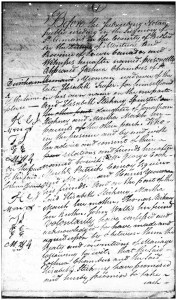
If you descend from French-Canadians, or your ancestors spent some time in Québec, notarial records will be an important source to examine in your research. In Québec, notaries recorded wills, property transactions, inventories, guardianship records, business contracts, and more. Some early notarial records even include marriage contracts. These records will undoubtedly aid your research and provide a wealth of information regarding your ancestors.
First and foremost, you have to establish which notaries practiced in the judicial district where your ancestor lived. To do so, you can consult finding aids. Here at NEHGS, we have finding aids located on the 4th floor, which list notaries alphabetically by surname and by judicial district. The years that each notary practiced are also listed. In our collection, we also have Robert J. Quintin’s The Notaries of French Canada, 1626-1900, a very helpful published finding aid. Each of these finding aids also lists the area that each notary served within a judicial district, like Champlain or Chambly.
Some digitized notarial records are located at Bibliothèque et Archives nationales du Québec, FamilySearch.org, and Ancestry.com. You can also order notarial records from FamilySearch. If you have a specific notary in mind, you can search for that notary in the catalog.
But I would strongly suggest a visit to the NEHGS library to examine our extensive collection of notarial records, which extends from the seventeenth century into the twentieth century. We also have indexes to many of these notarial records on microfiche. Indexes are especially crucial if you are examining notarial records recorded in Montréal or Québec. Many, many notaries practiced in these cities at any given time, and determining which notary that your ancestor may have utilized can be time consuming. Indexes will preserve your sanity!
One of the most helpful set of notarial records that I have examined are the records of Léon Lalanne, who was a notary in the Bedford and St. Francis Judicial Districts. Otherwise known as the Eastern Townships, he practiced between the years 1799–1815. Do you have a northern New England ancestor who you think may have “disappeared” in this region of Québec? If so, take a look at these records at the NEHGS library. You may be surprised!
As with any set of records, there are always things to be wary of. Here are a few tips:
- Notarial records are filed by judicial district, so do not be disheartened that you cannot find any notaries who are directly tied to, say, Lacolle. Lacolle is a part of the Iberville judicial district, and you will want to search for notaries affiliated with that area. Here is a helpful list of judicial districts in Québec.
- Be wary of boundary changes within the judicial districts!
- Indexes do not exist for every notary’s records.
- If there are a manageable amount of notaries practicing in the judicial district where your ancestor lived, examine all the notarial records available! Your ancestor may have employed more than one notary.
Your post could not have been more timely! The NEHGS research department is currently looking through Leon Lalanne’s notarial records for me. Already found have been a number of deeds which are useful to helping me figure out my DREW ancestors from New Hampshire & Maine, who were living in Barnston, Stanstead, Quebec, beginning in about 1795. I have recently extended the search for a few more years of records. Since I live in New Mexico, the cost is worth it.
Per your post, I may need to search additional Quebec notarial records for the Clarenceville (Caldwell’s Manor) location. I sure wish a birth, marriage, death, or guardianship record would show up in these searches. That would indeed be a gift!
I should have mentioned in my post, that Sheilagh is doing the research for me. Thank you Sheilagh!
I never use them because (1) they are not indexed (2) they are confusing and (3) most confirmation of French Canadian relatives are done in church and census records.
If you are dealing with people living in Quebec prior to the 1825 census, these notarial records can be useful. They don’t always help with relationships between the individuals named in deeds, but can help establish dates and locations. Church records in the Drouin collection have been helpful to me, also. And, you are right about no indexes in the notarial records – it takes patient slogging through microfilm.
Marriage contracts can be invaluable in cases where the priest omitted the names of parents or when the church records were lost. I would like to see more publication of the actual acts, and not merely the indices, but notarial records can provide a treasure trove of information.
Thanks for this post! My third great-parents are a brick wall. George Farrington was born in MA about 1805, per census records. He moved to the area of Stanbridge, Dunham, or St. Armand in what is now Quebec, prior to 1833 (my second great-grandfather’s birth) also per a petition requesting that Baptists be allowed to record birth, marriage, and death records (1835). He married a woman named Isabel there, and they had two children. They had moved to Porter County, IN, by about 1837, where they lived the rest of their lives. I have a feeling that those notarial records might reveal Isabel’s maiden name and who her parents were. One can hope!
Are anglophone records of Irish settlers in the Eastern townships in mid and late 1800’s included?